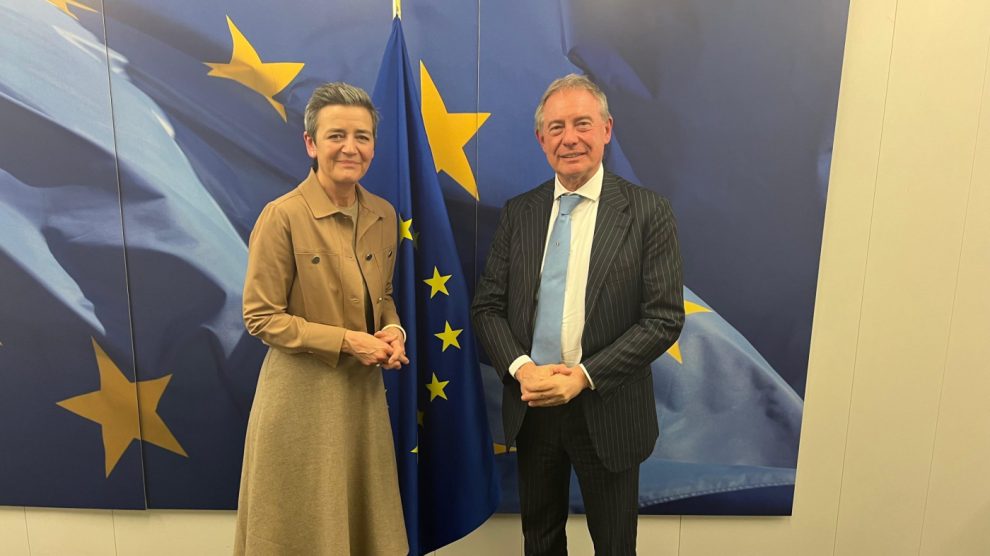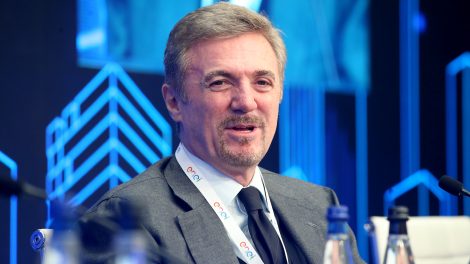Urso, Vestager and Breton talk industry, space. On Thursday, Italy’s Enterprise Minister Adolfo Urso with Competition Commissioner Margrethe Vestager and Internal Market Commissioner Thierry Breton at the European Commission headquarters in Brussels. They discussed the state of industries (especially the steel sector) in Italy and the European Union, as well as the prospects for air transport and telecommunications, and the work to bolster the EU’s reinvigorating space prowess – including via upcoming EU and Italian policies to build a space single market.
- Minister Urso also presented the Commissioners with the guidelines for the G-7 ministerial meeting on Industry and Space, to be held in Verona on March 14.
Not a moment too soon. The convergence between the EU’s green drive and the future of its industries is in the public’s crosshairs. Protesting farmers managed to get the Commission to backtrack on stricter agricultural rules, while the solar industry (closely watched by automakers) is warning policymakers that it’s about to collapse under the pressure of unsustainable Chinese competition.
- Moreover, bloc-wide elections loom in June – and far-right parties are surfing on the discontent generated by the Green Deal.
- Given they are projected to win more seats at the European Parliament, and judging by the moderate conservatives’ increasing scepticism, the next Commission may adopt a less ambitious and more pragmatic stance on the transition.
Enter Rome, whose right-wing government is already thinking in those terms. “Without questioning the final objectives of the European Green Deal,” especially reaching climate neutrality (i.e. net zero emission) in 2050, “the steps and ways to get there must be reviewed” to make them sustainable for societies and industries as well as the environment, Minister Urso told the press right after his meeting with Commissioner Vestager.
- “We know that, on environmental sustainability, Europe must set an example to the world; but it must do so by allowing its companies, its workers, its citizens to reach that goal while also protecting their business, of course.” Or else, he warned, workers will soon follow farmers on the streets.
- He touted Italy’s efforts over the past months to make Euro 7 auto emission standards and new EU eco-packaging laws less stringent. “We would like there to be more awareness, more adherence to the principle of reality, more common sense on this as well so that citizens and companies do not have to pay for it.”
Ongoing manoeuvers. While Friday’s EU vote on a new due diligence law has been postponed, Rome has signalled it might align with Berlin in abstaining. This would tank the piece of legislation, which would force large EU companies to check if their supply chains use forced labour or cause environmental damage and rectify if need be, as it would put the qualified majority threshold out of reach.
- Such a prospect has encountered resistance in Germany. Several key industries are linked to China’s Xinjiang region – where evidence of forced labour has been widely documented.
- According to Italy’s main industry lobby Confindustria, which has called on Rome to reject the law, its impact would “jeopardise the competitiveness of Italian industry, with consequent repercussions on social stability, not only in Italy but throughout Europe.”
- The law’s principles are sound, explained the body’s representative to the EU Stefan Pan, “but the text was finalised without listening to the insiders, with an ideological approach.”
Carbon and steel matters. The Italian Enterprise Minister went on to discuss the steel industry and the EU’s Carbon Border Adjustment Mechanism (CBAM), an emission-based, anti-dumping duty that’s being progressively phased in on some of the most energy-intensive imports in the European market. A tool that Mr Urso dubbed as “certainly necessary” but “not sufficient to support the competitiveness of the steel system in the EU, which we must preserve.”
- Today, there is “widespread awareness” of the need to guarantee Europe’s “strategic autonomy in sectors that are fundamental to our development and competitiveness,” he added; especially as the EU is “surrounded by wars” and keeping in mind the pandemic’s effects on supply chains.




